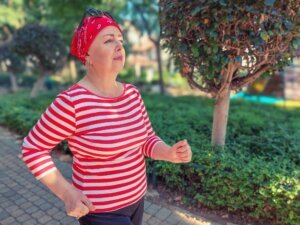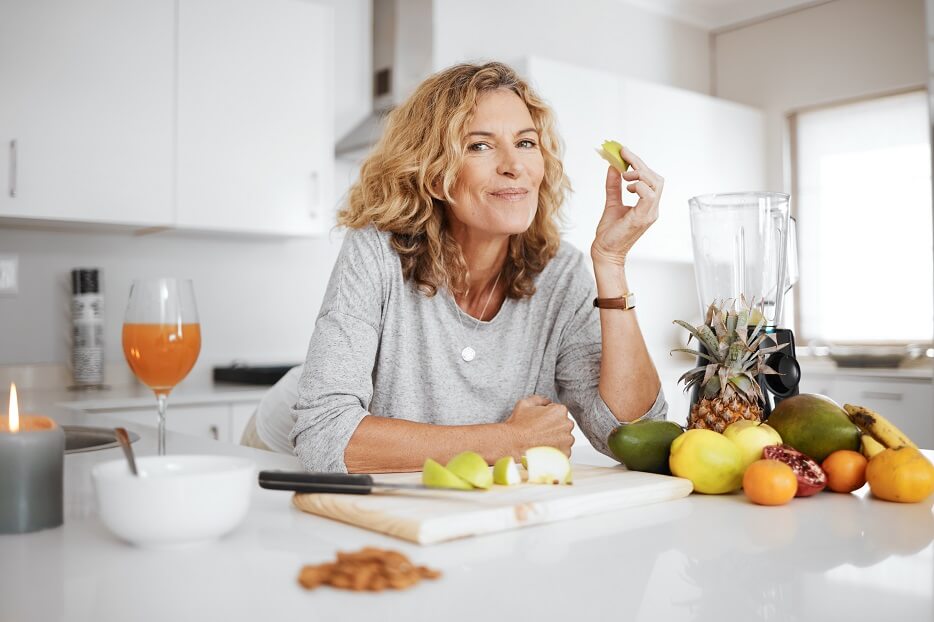Living well with and beyond cancer – what does this mean?

A healthy, balanced diet gives you all the nutrients you need to keep your body working well
Anyone who has had a diagnosis of cancer is someone who is living with or beyond their cancer. This could be someone who has completed their treatment or having ongoing treatment for their cancer.
More people than ever before are living with and beyond a cancer diagnosis. The impact of cancer does not suddenly stop when the treatment is over. You are now twice as likely to survive for at least ten years after a cancer diagnosis than you were 40 years ago.
But living longer doesn’t always mean living well. Following a cancer diagnosis, there are on-going needs for the growing number of people who have finished treatment but are still struggling to cope with the impact of cancer on their lives.
Currently there are two million people living with or beyond cancer in the UK. This figure is set to rise to four million by 2030.
What problems might a person living with and beyond cancer face?
People who have finished treatment may experience difficulties returning to normal life. They may:
- struggle emotionally, needing to adjust to changes treatment has made to their body
- have to cope with short-term and long-term side effects of their cancer or its treatment
- have to live with the knowledge that their cancer cannot be cured, even though they feel healthy
- have difficulties accessing information about their condition or any after effects they may experience
- struggle financially as the household income decreases
- experience problems returning to the workplace
It’s important that people do more than just live following a cancer diagnosis and treatment, they should be able to live well.
Physical activity

Physical activity can help improve physical and psychological health
Physical activity is any form of exercise or activity involving movement that uses your muscles. It helps to improve your physical and psychological health. Being fitter and stronger will really help you to manage your daily activities, as well as increasing the level of feel-good chemicals (endorphins) in the body. This can be a positive way of coping with the sometimes overwhelming intensity of emotions.
Physical activity is recommended by the National Cancer Institute and the British Association of Sport and Exercise Science. They advise that physical activity is safe and effective before, during and after cancer treatment.
There is research evidence that physical activity can help in the following ways:
- Reduce side effects of treatment such as fatigue
- Improve quality of life
- Reduce the risk of cancer coming back
- Help look after your heart and manage other health problems
- Reduce anxiety and depression
- Help maintain a healthy weight
- Strengthen your muscles, joints and bones
- Improve your flexibility and help keep you supple
- Increase your confidence
Diet
Eating well can sometimes prove challenging following a cancer diagnosis, due to the physical side-effects of certain cancers and their treatments. Optimising your intake to achieve the most balanced diet possible can have many positive health benefits, including improved immune system function, better energy levels and improved mood. Specialist dietary advice may be provided following a cancer diagnosis/ treatment, which should always be adhered to.
There may be times during your cancer treatment when you are unable to eat well. Losing weight or having a reduced food intake can make it more difficult for you to cope with treatments like surgery, radiotherapy and chemotherapy.
During these times you may need to change the balance of your diet to include different foods. It may also be helpful to alter when or how often you eat to make sure you try to eat enough. These may be short-term or long-term changes depending on your treatment and health.
Eating well generally means eating a diet rich in wholegrains, vegetables, fruit and pulses, with lean meat, fish and lower fat dairy.
After a cancer diagnosis, many people find making the decision to follow a healthy, balanced diet helps give them back a sense of control. Having a healthy, balanced diet is one of the best choices you can make for your overall health. This includes thinking about what and how much alcohol you drink.
Before making changes to your diet, it can help to talk to a dietitian, your GP or a specialist nurse. This may be especially useful if you have any special dietary requirements or medical needs.
Healthy eating
Healthier diets could help prevent up to one-third of cancers (30%) in the UK. Research shows that being overweight increases the risk of developing some types of cancer. There are many reasons why people are overweight. But an unhealthy diet and lack of physical activity are often factors.
- Some foods may increase our risk of cancer, but others may protect us. The link between diet and the risk of developing cancer is complicated. Research suggests that eating more fibre may reduce the risk of certain cancers.
- Eating a lot or red and processed meat may increase the risk of bowel cancer.
What to eat
Food has nutrients that our bodies need. The main groups of nutrients are carbohydrates, proteins, vitamins and minerals, fats, fibre and fluids.
A healthy, balanced diet gives you all the nutrients you need to keep your body working well. For most people, this includes:
- lots of fruit and vegetables – at least five portions a day
- plenty of starchy foods (carbohydrates) – choose wholegrain types such as wholemeal bread, rice, pasta, noodles, couscous and potatoes
- some protein-rich foods, such as lean meat, poultry, fish, nuts, eggs and pulses (beans and lentils)
- some milk and dairy foods, such as cheese and yoghurt.
- You should limit foods that are high in added sugar, salt or saturated fat such as butter, cream and cheese. This includes highly processed foods and drinks such as biscuits, crisps, fast foods, ice cream and sugar-sweetened soft drinks (like cola).. This is because they often do not have any additional vitamins or minerals. High-fat or sugary foods give you a large amount of energy, but they can cause weight gain. Choose unsaturated fats, such as nuts, avocados and olive oil. It also means limiting foods and drinks that are high
- It is best to drink water or unsweetened squashes that contain no added sugar. You can also drink tea and coffee (without sugar). If you drink fizzy drinks or sugary squashes, try to reduce the amount you drink and have the diet, sugar-free types instead. Try to limit the amount of fruit juice you drink to 1 glass a day (150ml), as these also contain sugar. It is better to eat whole fruits.
- Try to reduce the amount of processed (like ham and bacon) and red meats you eat.
Eating well and keeping to a healthy weight will help:
- you feel stronger
- increase your energy levels
- keep your immune system healthy
- improve your sense of well-being
- It can also help reduce the risk of new cancers and other diseases, such as heart disease, diabetes and strokes.
After cancer treatment, some people have a higher risk of other health problems. This can include diabetes, heart disease or osteoporosis (bone thinning). If you have been told that you are at increased risk, it is very important to follow a healthy diet to help prevent them. Some people also need to make changes to their diet if cancer treatment has affected their immune system.
Sleep
It might sound obvious, but a good night’s sleep can profoundly affect how well or poorly equipped we feel to face the challenges of each new day. Getting into a healthy sleep routine can help us to feel more physically and mentally able to function on a daily basis. A healthy sleep routine might involve:
Keeping regular hours – Going to bed and getting up at the same time each day and avoiding daytime naps will help programme your body to better sleep.
Creating a restful sleeping environment – as quiet and dark as possible. Try and make sure your bed is comfortable, with distractions (e.g. TV) relegated to another room.
Reducing stimulants (e.g. alcohol, caffeine, nicotine) in the evenings as they are known to disrupt sleep quality. Instead have a warm, milky drink or herbal tea.
Exercising regularly, but not too close to bedtime
Keeping a ‘worry pad’ – before bedtime, jot down any worries on your mind. The goal is to avoid doing these things when you’re in bed trying to sleep and spend time the next day thinking through them.
Practising relaxation – have a warm bath, listen to quiet music or do some gentle yoga to relax mind and body.
Don’t struggle in bed – If you can’t sleep, try not to lie there worrying about it. If after a while you realise you’re not getting to sleep, get up and do something you find relaxing until you feel sleepy again, then return to bed. This is so your mind associates your bedroom with a place for sleeping, not stress.
There is no ‘right’ way to feel
Having a positive mental attitude during and after cancer treatment can be beneficial. However, it is normal to feel a range of emotions when you are coping with treatment and recovering from it and allowing yourself to feel these without pressure to remain endlessly positive is important. Having the opportunity to talk openly and honestly about how you are feeling can be invaluable, whether this is with friends and family or through a support group such as Cancer Coach
If you feel that your mood is getting in the way of you being able to do things that matter to you (e.g. at home or work) then it is worth seeing your GP or nurse specialist to talk about options for psychological support.
Mindfulness
It’s common to find our mind worrying about the future or dwelling on the past, but this can turn up feelings of worry and low mood. Mindfulness techniques can help you to let go of the struggle with difficult thoughts and feelings and focus on the present moment. With practice, mindfulness can have a wide range of benefits including reduced depression and worry, increased sense of calm and ability to cope with physical symptoms (like pain and fatigue), as well as an enhanced wellbeing generally.
There is plenty of information available about mindfulness techniques, breathing exercises and other wellbeing exercises on the internet. Or you can join our Cancer Coach programme, where you can learn these techniques. In addition, very shortly, they will be available as downloadable information sheets from our website.
Body confidence
Experiencing cancer and treatment for cancer may have an impact on your appearance and the way in which you might see your body or feel about the way you look. Tips for dealing with changes in appearance include:
- Planning and practising ways to confidently answer any comments or questions.
- Taking steps to feel better about your appearance e.g. attending a Look Good Feel Better workshop
- Physical activity and exercise can improve how you feel about your body whilst releasing feel-good chemicals into your system.
- Keeping a journal or express your thoughts, worries and anxieties in writing or in a creative visual way that allows you to help process difficult emotions.
- Talking to others and letting them know if you need more support.
It can feel difficult to adjust to, and talk about, changes in appearance. However, keeping your feelings to yourself can sometimes stop you doing things you enjoy or getting the right help. It can help be helpful to talk about your feelings with someone you trust and who you feel comfortable or you may find it helpful to write down your questions or concerns and share these with your health professional or your support group.


